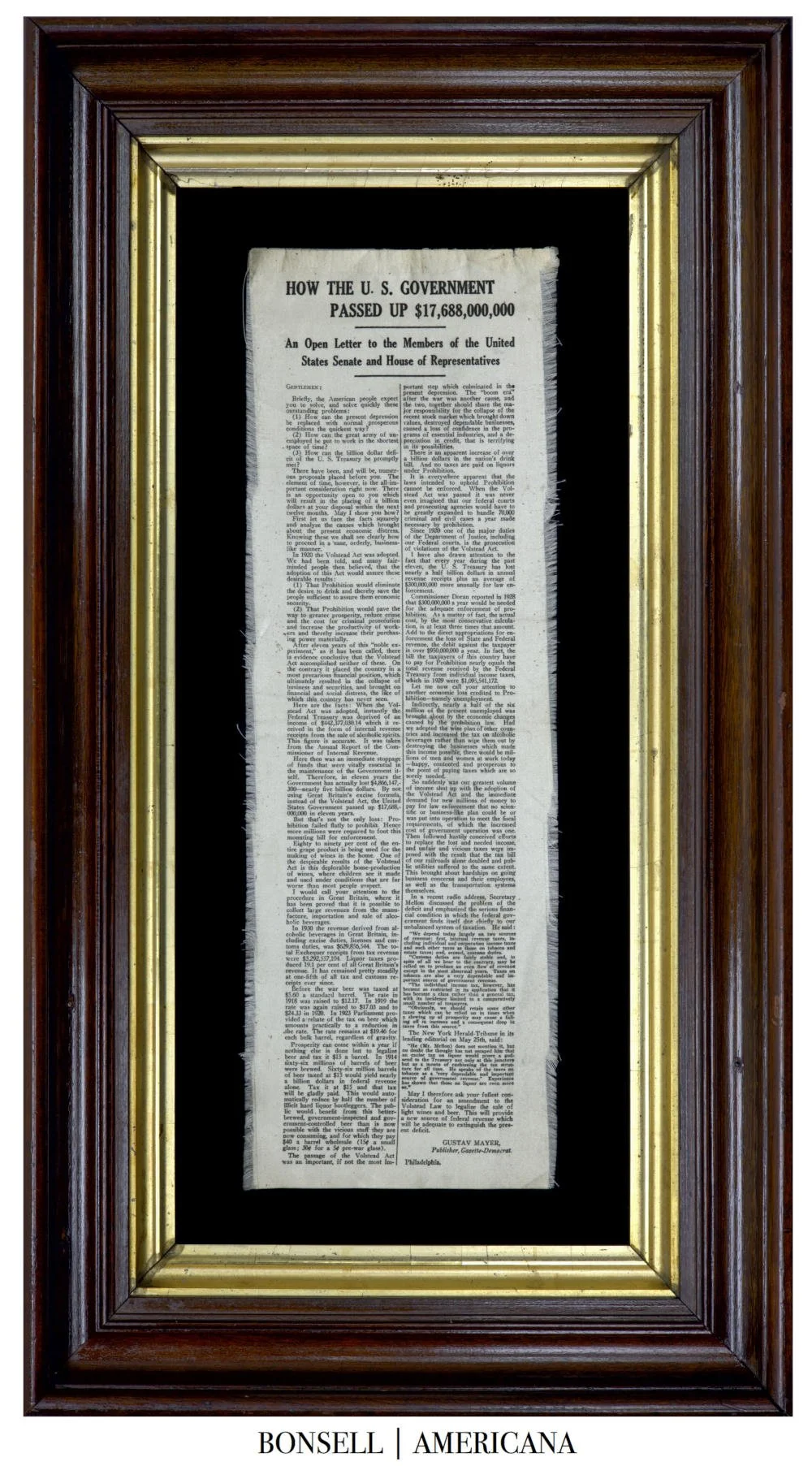A Rare Broadside on Linen Urging Policy Change During Prohibition | An Open Letter on Prohibition’s Economic Impact | Circa 1920 to 1933
A Rare Broadside on Linen Urging Policy Change During Prohibition | An Open Letter on Prohibition’s Economic Impact | Circa 1920 to 1933
Frame Size (H x W): 17.75” x 6”
Broadside Size (H x W): 25.5” x 14”
Offered is a rare broadside titled "How the U.S. Government Passed Up $17,688,000,000," with the subtitle "An Open Letter to the Members of the United States Senate and House of Representatives" prominently printed in bold at the top. Featuring a two-column layout with densely packed text, it presents a detailed argument about the economic consequences of Prohibition, focusing on the loss of tax revenue from alcohol taxation. Printed on lightweight, plain-woven linen, the material adds both durability and a sense of significance to the document.
Crafted from the fibers of the flax plant, the plain-woven linen used for this broadside provides a smooth, durable, and slightly lustrous surface ideal for clear, detailed printing. Linen's lightweight nature made it practical for handling and transport while retaining its structural integrity. During the Prohibition era, linen’s prestige and resilience reflected the importance of its message, aligning with the cultural and historical demands of the period.
This broadside delivers an economic critique of Prohibition, highlighting the $17 billion in potential tax revenue forfeited due to the Volstead Act. Addressed to members of Congress, it frames Prohibition as both a moral failure and a financial catastrophe, urging lawmakers to reconsider the policy. By emphasizing the ban’s economic consequences, the piece shifts the debate from ideological concerns to pragmatic fiscal realities, making a strong case for repealing the legislation.
During Prohibition (1920–1933), alcohol was outlawed across the United States in an effort to curb societal issues such as crime and alcoholism. While initially seen as a moral victory, the policy's unintended consequences quickly became evident. Organized crime surged as illegal distilleries and bootleggers met the persistent demand for alcohol, while the federal government, heavily reliant on alcohol taxes, faced severe revenue shortfalls. This broadside criticizes these impacts, proposing that regulated alcohol production could restore public funding and weaken the black market.
The broadside also presents an alternative vision for alcohol regulation, advocating for government-controlled production and taxation to generate revenue and ensure safety. It argues that such regulation would benefit the economy and the public by replacing dangerous, unregulated liquor with inspected and affordable options. This pragmatic approach likely resonated with lawmakers and citizens alike, especially as the Great Depression deepened the need for economic reform.
This fabric broadside exemplifies the growing opposition to Prohibition in the late 1920s and early 1930s, reflecting grassroots pressure that contributed to the eventual repeal of the Volstead Act through the 21st Amendment in 1933. The choice to print on linen, rather than paper, underscores its intended durability and importance, ensuring the message's longevity. By grounding its argument in economic terms, this broadside serves as an artifact of the Prohibition era, reflecting the tensions and debates that shaped one of America’s most significant policy reversals.
Conservation Process: The broadside was hand sewn to cotton fabric, and both were hand sewn to a mounting board. To prevent the black dye in the cotton fabric from seeping into the broadside, it was first washed in a standard wash and then in a dye setting wash. The broadside is positioned behind Optium Museum Acrylic.
Frame: The frame is made of walnut and dates from 1860 to 1890. Its dark wood and simple craftsmanship reflect the style of the period.
Condition: The broadside is in excellent condition overall, with light staining that does not detract from its legibility or visual appeal. The fraying along the edges is consistent with the fabric's original lightweight linen construction and reflects its natural wear rather than damage.
Collectability Level: The Good – Perfect for Beginning Collectors and Gifts
Date of Origin: 1920-1933












